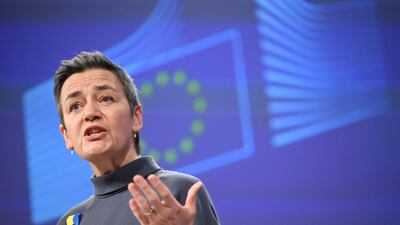The European Commission on Tuesday proposed a new €1.5 billion ($1.63 billion) defence industry programme, which would be financed from the European Union budget for 2025 to 2027.
"We do so to respond to the changes of Europe's security paradigm, because not so far away from here Ukrainians are fighting for their freedom and common values in a war that has already caused immense human tragedy," Commission Vice-President Margrethe Vestager said.
"In the last two years, we have faced a situation of a defence industry without sufficient capacity to meet the sharp increase of demand.
"We have been vividly confronted with well-known structural fragmentation along national borders. They limit economies of scale. They create mistrust while preventing genuine competition between industrial players. This entails major inefficiencies and an inefficient value for taxpayers' money."
The new programme calls on the 27 EU members states to procure at least 40 per cent of their defence equipment collectively by 2030 and aims to have the value of intra-EU defence trade to represent at least 35 per cent of the EU defence market, it added.
Only 18 per cent of procurements are currently done in a co-operative manner.
"To increase European defence industrial readiness, member states need to invest more, better, together, and European," the EU Commission said in a statement.
Russia's war with Ukraine has prompted many European countries to increase their defence spending, though EU officials have argued purely national efforts are less efficient and want EU bodies to play a greater role in defence industrial policy.
Since the start of the war in February 2022, almost 80 per cent of defence acquisitions by EU member states were made outside the bloc, said Ms Vestager. The US alone accounted for 68 per cent of this spending. "This is no longer sustainable, if it ever was," she said.
EU officials said the new defence programme was launched in close co-ordination with Nato. The possible re-election of Donald Trump as US president later this year has caused worries in European capitals due to his repeated statements casting doubt on whether he would continue supporting them in the face of Russian expansionism.
"We need to get the transatlantic balance right, irrespective of election dynamics in the US," said Ms Vestager. "We must take more responsibility for our own security.
The pan-European defence market must also become more balanced, said Josep Borrell, the EU's foreign policy and security chief, speaking alongside Ms Vestager. "Ninety per cent of the European defence capacity is concentrated in a few member states," he said.
In 2022, defence investment by the bloc's 27 countries amounted to $58 billion, compared to $215 billion in the US, said Mr Borrell. "This strategy will try to incentivise joint procurement on joint capabilities ... we don't want to spend more, but [spend] better," he said.
The Commission also seeks to help the European defence industry prepare for existing and potential major challenges such as a sudden surge in demand for large amounts of artillery ammunition.
Defence is at the heart of Commission President Ursula von der Leyen's bid for a second term in European elections in June. Last month, Ms von der Leyen said she was considering creating a dedicated defence commissioner post. These responsibilities are currently overseen by Internal Market Commissioner Thierry Breton.
Speaking at the press conference, Mr Breton said the new defence strategy was aimed at closely integrating Ukraine in the European defence industry, "step by step".
"It's the first time we are doing this," he said. "We believe it'll be highly appreciated" in Kyiv."
Mr Breton has urged the bloc to consider spending €100 billion, while some European leaders have called for joint bonds to meet that level of defence spending. Such measures are unlikely to take off before European elections this summer.
Officials pushed back on claims by European politicians that the Commission was seeking to overstep its powers and oversee countries' defence decisions.
"We don't intend to have an arms depot here at Berlaymont [the Commission building]," said Mr Borrell. "This is industrial policy in the critical sector that is defence."


